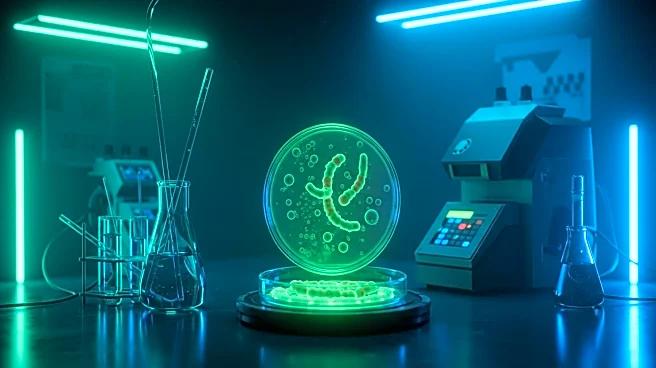What's Happening?
A study conducted by researchers at the University of Oxford and the MRC Laboratory of Medical Sciences has uncovered the potential for ancient archaea to produce antibacterial compounds. The research, published in PLOS Biology, focuses on the interactions between archaea and bacteria, particularly the production of peptidoglycan hydrolases by archaea. These enzymes can cleave bacterial cell walls, suggesting a competitive relationship between the two groups of microorganisms. The study involved analyzing genetic sequences from a large database of prokaryotes, identifying homologs of peptidoglycan hydrolases in archaea. The findings indicate that archaea may serve as a reservoir for novel antibacterial agents, offering a new avenue for combating antibiotic resistance.
Why It's Important?
The discovery of antibacterial compounds in archaea is significant in the context of rising antibiotic resistance. As traditional antibiotics become less effective, the need for alternative treatments is critical. Archaea, often found in extreme environments, represent an untapped source of potential antimicrobials. This research could lead to the development of new drugs that target resistant bacteria, improving public health outcomes. Additionally, understanding the interactions between archaea and bacteria enhances our knowledge of microbial ecosystems, which could inform strategies for managing infections and maintaining microbial balance.
What's Next?
Future research will focus on further characterizing the antibacterial properties of archaea-derived compounds and their potential applications in medicine. Studies will aim to isolate and test these compounds against various bacterial strains, particularly those resistant to current antibiotics. Collaboration between microbiologists and pharmaceutical companies could accelerate the development of new treatments. Additionally, exploring the ecological roles of archaea in microbial communities may provide insights into their broader impact on health and disease.
Beyond the Headlines
The study highlights the importance of biodiversity in scientific research, emphasizing the potential benefits of exploring lesser-known organisms. Ethical considerations regarding the use of archaea-derived compounds in medicine will need to be addressed, particularly in terms of environmental impact and sustainability. The findings also underscore the interconnectedness of microbial life, suggesting that preserving diverse ecosystems may have direct implications for human health.









